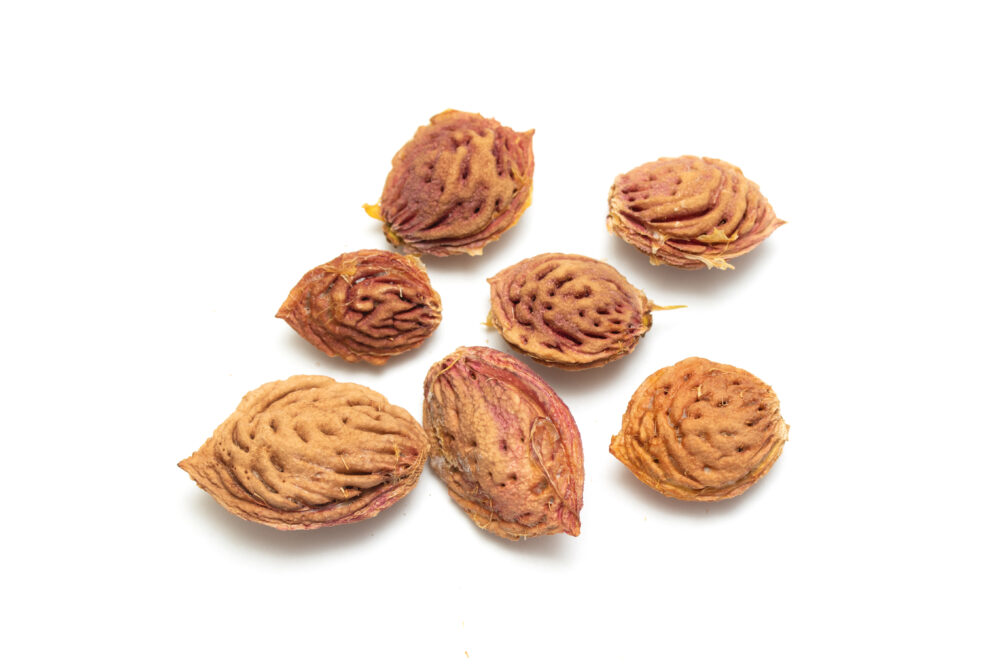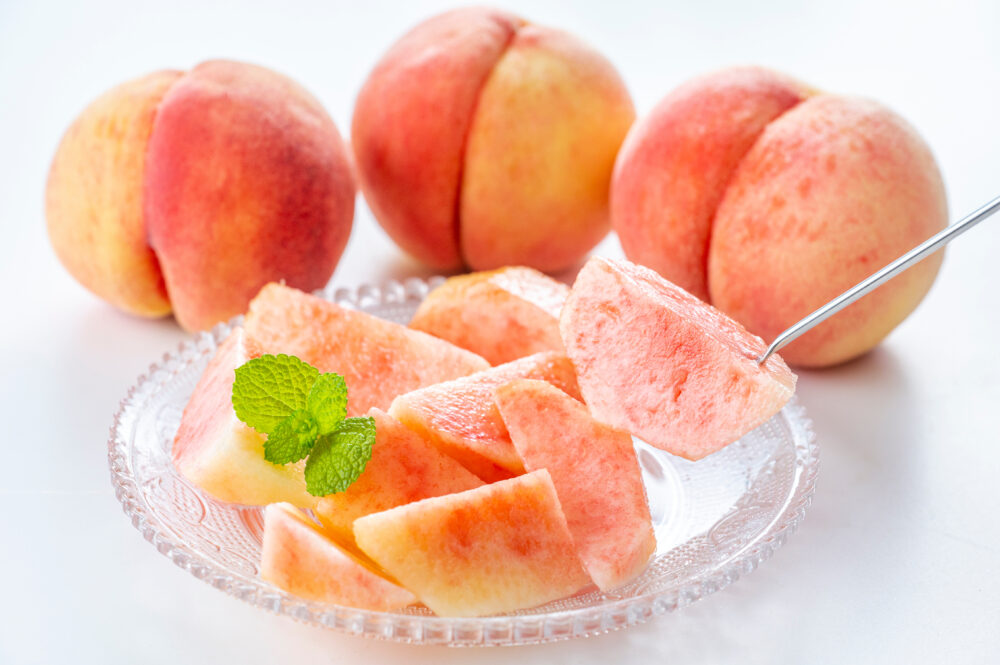The flesh of ripe peaches does not contain ingredients that can cause poisoning in dogs, so they are safe for dogs to eat.
However, it is important to observe a few precautions when feeding peaches to dogs. This article details the proper methods and precautions for considering peaches for dogs.
∙ Dangers of peach seeds and how to deal with them
・Nutrition, advantages and disadvantages of peaches
・The amount and precautions when giving peaches.
Peach seeds are easy to swallow

What to do if you eat it
Peach seeds contain a toxic substance called amygdalin.
This substance is highly toxic to dogs and can cause poisoning if the seeds are accidentally swallowed. The skin may also contain pesticides. Feed only the pulp to your dog.
If a peach seed is accidentally swallowed, consult a veterinarian. Professional guidance is needed because peach seeds are not processed by the dog’s digestive system and may release harmful components. The veterinary clinic will perform ultrasound and x-ray examinations and take appropriate measures.
Endoscopy or laparotomy may be necessary depending on the condition. Do not make judgments on your own, but seek professional advice and follow instructions.
peach seeds
Peach seeds have a rough surface.
Rough seeds are difficult to expel and remain in the body, posing a risk of intestinal obstruction, which can be life-threatening in the worst case scenario.
Depending on the size of the seeds, if they are larger than the diameter of the intestine, they cannot be excreted, resulting in intestinal obstruction.
Can dogs eat peaches?

This fruit is rich in water and fiber and can be considered a summer hydrator and constipation remedy for dogs.
The flesh of ripe peaches is safe to feed to dogs because it does not contain ingredients that can cause poisoning in dogs.
Although peaches are one of the safest fruits for dogs, there are a few things to keep in mind. Peaches are high in sugar, so it is important to be careful with moderate amounts.
peach nutrition

Peaches contain nutrients that are good for your dog’s health. Key nutrients and their characteristics include
Peaches are about 90% water, which helps keep dogs hydrated.
Dietary fiber
value blood sugar and helps improve diarrhea.
potassium
It regulates blood pressure and normalizes nerve function.
Care should be taken not to consume too much, as it can be hard on the kidneys.
Vitamin C
It is a powerful antioxidant and supports immune function. Dogs can produce it in their bodies, but it is recommended to take it as needed!
aspartic acid
It is utilized as a source of energy and helps relieve fatigue. Promotes the absorption of potassium and magnesium.
Niacin
It is involved in energy production and metabolism, and a deficiency can cause symptoms such as skin irritation and diarrhea.
how much peaches to give your dog

To consider peaches, calculate the appropriate amount for your dog’s weight.
・Small dog (weight about 3㎏): 60g level peach 1/4
・Medium-sized dog (weight about 10㎏): 160g level Peach 3/4
・Large dog (weight about 30㎏): 370g degree, 1 peach and half portion
Peaches should be considered a treat and should be given in the correct amount based on the dog’s weight.
There is a risk of obesity and diabetes, so think carefully.
It is important to adjust the amount based on the dog’s age, physical activity, and health. Peaches contain a lot of water and fructose, which is a risk for obesity and diabetes. Think carefully. Be careful not to overdose.
Precautions in consideration of peaches

Always remove the seeds and skin from peaches before feeding them to your dog. Peach seeds contain safe ingredients that can be dangerous if accidentally consumed.
Canned and processed peaches are high in sugar and should not be given to dogs.
Be aware of peach allergies. Allergic reactions may occur in some dogs.
Peaches should be avoided for dogs with kidney problems.

Peaches are high in potassium and should be avoided in dogs with weak kidney function.
Peaches can be enjoyed as a nutritious snack, but should be given in appropriate amounts and with care.
Cut them into bite-sized pieces for easy consumption.
Precautions when giving peaches to dogs

Be careful not to give too much
Because peaches are high in sugar, excessive consumption can lead to concerns about the risk of obesity and diabetes.
Keep within 10% of your dog’s daily caloric intake.
Be careful not to overeat and adjust the amount according to your dog’s weight and health.
Rosaceae allergy
Peaches belong to the Rosaceae family and may cause allergic reactions in dogs allergic to Rosaceae. Watch them carefully.
How to deal with allergies
If you are considering peaches for the first time, an allergic reaction may occur.
If symptoms such as diarrhea, vomiting, or itching appear, do not feed peaches and consult a veterinarian to address the problem.
don’t give skin
Do not feed peaches because of the risk of pesticide residues in the peel. Peel the skin and feed only the fruit.
Beware of accidental ingestion of seeds
Peach seeds contain a toxic substance called amygdalin, which can cause serious poisoning if accidentally swallowed. Never save the seeds before feeding peaches.
canned food is dangerous
Canned peaches are high in sugar.
Do not give your dog too much sugar, as it is detrimental to his health. Give fresh pulp, as commercially processed, canned, and juiced products may contain sugar and additives.
If you offer peach juice or jelly, choose one without additives. Also, if you make homemade juice or jelly, be sure it does not contain preservatives.
These are some of the key points and considerations when thinking about peaches for your dog.
Peaches are a fruit rich in water and fiber, which can be helpful to dogs for summer hydration and constipation relief. And while they are nutritious and can be enjoyed as a treat, be sure to follow the correct amounts and precautions to protect your dog’s health.


コメント